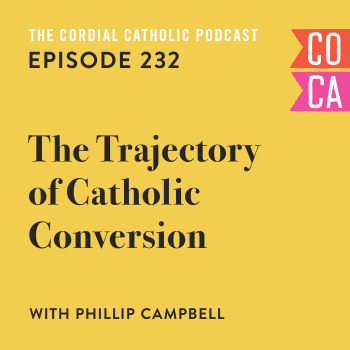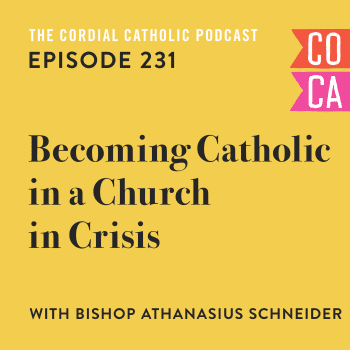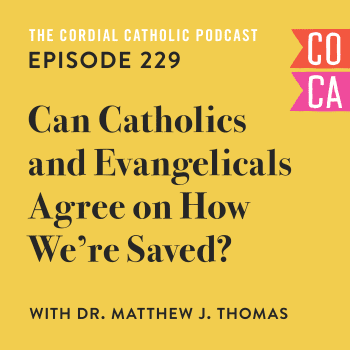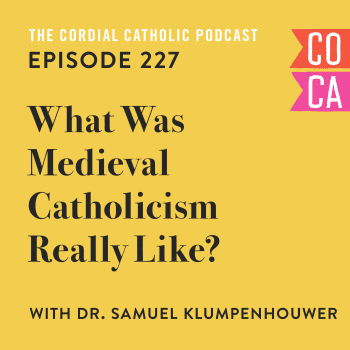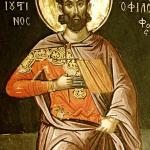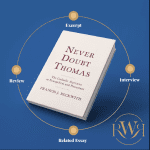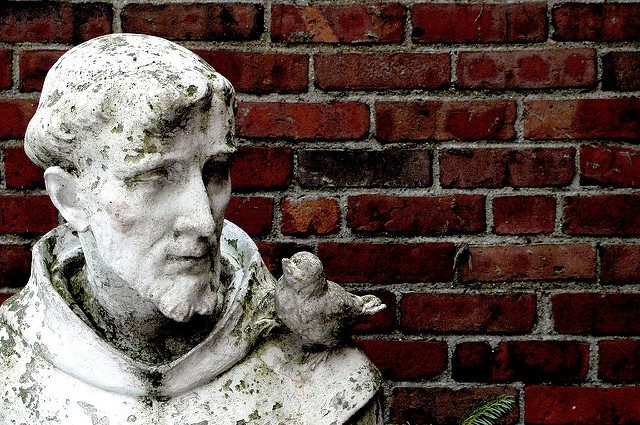
When I think about my journey into the Catholic Church an old song by Pedro the Lion comes to mind. It’s a great tune called “Letter from a Concerned Follower,” and the line I’m thinking of unfolds like this,
And I hear that you don’t change
How to you expect to keep up with the trends?
You won’t survive the information age
Unless you plan to change the truth
To accommodate the brilliance of men,
the brilliance of men.
Written from the perspective of a struggling Christian, Letter from a Concerned Follower asks Christ how He, and His Church, can expect to keep up with the times.
How do you expect to accommodate the brilliance of men?
Our ideas, innovations, and adjustments?
I think about this often because it’s the flipside of a question I get all the time.
Is older better?
Doesn’t the Christian Church need to innovate? Need to change? To adapt?
The historicity of the Catholic Church was key in my conversion: the unbroken line from the Apostles to today. The stalwart tug of doing things—in large part—the way they’ve been done for two thousand years. The assuredness of the authority of the Seat of Peter. An ancient understanding of the Eucharist, Baptism, and hierarchical structure of the Church.
As I meandered a sort of garden path towards a more ancient faith it was these old things that finally brought me home.
But, is older better?
First, it’s important to recognize that Catholics and non-Catholics understand the Christian Church in particularly different ways. This is fundamental for how we speak about the Church, and if we’re going to understand each other most clearly.
For the Catholic, the Church is that which was founded by Christ. A distinctively hierarchical, authoritative structure through which the Holy Spirit flows, through which Christians are bound together—which is mystical and holy. Like the Early Church Fathers, who set up bishoprics and assigned new leaders when older ones faltered and passed away, the Catholic Church sees itself as both invisible and visible.
An invisible union of all Christians; a visible authority on Earth.
To the ears of the average Evangelical, words like hierarchy and authority may have no place in their lexicon. I get it. The Church, instead, is that invisible union of all Christians around the world. Full stop.
Here, as I said, it’s important to understand the different meanings of the words we use.
But let’s not lose sight of our question, “Is older really better?”
In the 16th century Martin Luther, a Catholic monk, decided from a plain reading of Scripture that the Catholic Church had got, and was getting, a lot of things wrong. Chief among these concerns were indulgences, the papacy, and the nature of salvation. Luther made a split from the authority structure Catholic Church but it’s important—for our question—to understand that Luther was not an innovator.
Luther did not believe that was he was doing was innovation. He believed, based on his reading of Scriptures, and on some interpretations of Early Church Fathers like St. Augustine, that he had found what he believed to be a more correct interpretation of Scripture.
He believed his doctrine, in opposition to the Catholic Church, was actually closer to the sources.
Closer to what was originally believed by the writers of the New Testament (most of them at least).
Luther was not innovating but going back to the sources.
Luther was arguing that older was better: That the Catholic Church had strayed from a pure presentation of the Gospel with its addition of tradition.
To be fair, Luther’s understanding of sola Scriptura is widely different from how we’d describe it today. Luther—and his Lutherans—understood the importance of interpreting Scripture within the context of a community and, fundamentally, that not every individual Christian should read and interpret for themselves.
Luther, who was instrumental in getting his Bible into the hands of the people in their own language would later—rather swiftly—argue for it’s removal.
But once the cat’s out of the bag it’s almost impossible to stick him back in again.
Because claws.
Far from censoring the Bible or holding a monopoly, the Catholic Church rightly understood the danger of putting a difficult-to-understand text into the hands of the uneducated masses. The potential for misuse, abuse, and misunderstanding was enormous.
But the question remains, “Is older really better?”
Certainly Martin Luther, the father of the Reformation, thought so. His was a movement back to the Bible from within a Church that he saw as having gone astray.
Unfortunately, five centuries removed from Luther and the beginnings of the Lutheran church we’re left with an Evangelical Christianity based the Bible alone apart, even, from Luther’s understanding of how the Bible should be read: in a strict community context. Interpreting together.
And while Luther understood older to be better—a Christianity closer to its source—we’ve come along way in a different direction.
To oppose the claim that older is better is the argument that Christianity needs—must—constantly adapt and change. In its music, its message, its teaching… it’s theology.
But is this what Jesus intended? A constantly evolving Christianity?
Interestingly, many Catholic bishops and theologians, writing at the time of the Reformation, argued precisely against such a notion. Many Protestant Reformers, too.
That a Christianity, stripped of the authority of the Church, would have to constantly evolve and change and who was to say whose interpretation was right (and whose interpretations were wrong).
A Christianity based solely on a Bible which is up for interpretation—in which, if I don’t like the interpretation of Pastor Jim I can head down the street to study under Pastor Phil. In which, for most denominations, the idea of authority is untenable. In which even the most earnest and honest Christians must admit that we think we have it right but we can’t be sure (because the Bible can be confusing, and we’re not all Bible scholars).
Without a authority structure to definitively hand down teachings Christianity becomes a sort of survival of the fittest: which interpretation of the Bible can be made most modern, which is catching on, and which bits should we sweep under the rug?
Shucks, only half-mad Aunt Tilley believes in that anymore.
In this case, in my opinion, older is better.
In the end, my inestimable wife said it best in a discussion we had late one evening. Despite all of my best efforts and my most miserable examples she decided, a year after I did, to join the Catholic Church too.
She said that, ultimately, what it comes down to is a measure of humility.
The recognition that maybe we don’t know everything but maybe we should cleave to a Church with a distinctive, ancient, two-thousand year old history of doing things a certain way. That it’s humbling and, sometimes, I would add, humiliating, but it forces us not to put ourselves and our interpretations first but to trust in something bigger than ourselves—and with the weight of history and holiness behind it.
A Church that can trace its ancestry—with a straight line—back to Jesus Christ Himself when He stood on this very earth.
And although we might opine, like the concerned follower in our song,
And I hear that you don’t change
How to you expect to keep up with the trends?
we recognize that a constantly evolving, constantly adapting Church, is exactly the opposite of what the original Protestant Reformers had in mind. Exactly what Catholic writers warned the Reformers would happen. And exactly the opposite of the timeless message of Jesus who said that nothing will overcome His Church.
Stay in touch! Like The Cordial Catholic on Facebook:








